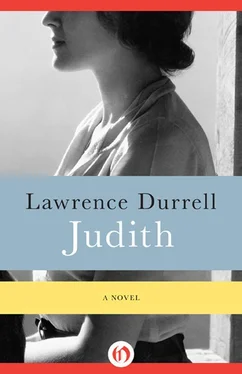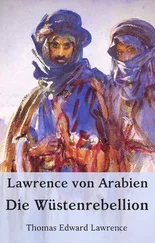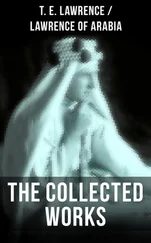“I shouldn’t go down to Ras Shamir tonight,” said the grizzled sergeant. “There was some shooting earlier on the hills and a patrol reported some Arab cavalry on the crest to the east.”
“We’ll risk it,” said Aaron blithely, “even though we are unarmed as you can see. It’s a question of urgency. The truck is needed tomorrow.”
“Well, it’s up to you. I’m just warning you.”
Aaron lit a cigarette as he watched the truck cleared and the girls helped back into it by a kindly private. “You can tell the Major from me,” he said, “that if the British are supposed to be responsible for this valley they are making a poor job of it. Things would be perfectly quiet if they patrolled enough and took some interest.”
The sergeant chuckled, showing yellow teeth. “The Major knows that as well as you. But they won’t give us the men. What can we do?”
“Leave it to us,” said Aaron mildly. “Instead of making our lives a misery on the kibbutz and trying to prevent us arming ourselves. You want us to be eaten by the Arabs.”
“Personally, I don’t care who eats who,” said the sergeant.
“That’s clear.”
“But I’ll tell the Major what you said.”
“Save your breath — I’ve told him myself more than once.”
The privates had cleared the lorry, and helped the occupants back into their uncomfortable seats. The sergeant sighed. “Okay,” he said, “off you go.”
And off they went, the rumble of the engine again flapping and booming at them. Without a word or a look, Aaron reached back and repossessed himself of his pistol. “Anna,” he said, “just stop at the head of the pass and let me have a look.”
The twilight was lengthening into darkness. They were shivering with cold. At the next bluff the cliffs fell away and they saw, gleaming below them, a long diamond-shaped valley which thrust its muzzle deep between two mountain ranges. Light twinkled here and there in it, made furry by the atmosphere. “Ras Shamir,” said the doctor, pointing downwards. “The mountains are the border — Syria that side, Lebanon this.” Judith gazed uncomprehendingly down across the scarps and foothills into the fading hollow which was brimming now with inky darkness. But Aaron was out on the road, already sweeping the mountain range with his glasses. Finally he seemed satisfied for he returned and said: “No. It looks normal. There are all the lights up. It’s probably a false alarm. Anyway, what the hell. Let’s get moving.” From now on it was a steeply falling gradient, and Anna let the lorry gather speed. Judith was surprised that no one showed any undue alarm, in spite of the warning and, as if the doctor had surprised her thought and read it, she heard the gentle voice say: “All in the day’s work.” Down they swept round the hairpin bends, their lights cutting a dim path for them. And now, to increase Judith’s surprise, Anna began to sing an old Hebrew song and, after the first phrase, Aaron joined in with his deep baritone. It was infectious. The doctor, too, began to hum and one of the girls in the back who knew the song suddenly lent her voice to it. On rumbled the lorry with its freight of singers, and gradually the air became warmer as they descended, until they were once more on the valley level, rumbling across dusty roads lined with tall trees. Orchards stretched away on every side, the leaves of the trees dusted pollen-yellow in the faded gleam of their headlights. Darkness had fallen fully now, dense and deeply scented by flowers. They crossed a number of small bridges and traversed long areas of meadows where the water of the carp ponds gleamed back at them with a dull metallic lustre. Finally, they appeared to have traversed the whole valley, for the mountain range began to rise once more, etched on the sky. It was in its shadow that they turned aside, stumbled and rattled over a long dirt-track and arrived at a grove of trees with a perimeter of barbed wire and a gate. There was an unarmed man on sentry duty who flashed a torch and interrogated them hoarsely. Then the gate swung wide and they drove into the deep tree-grove. And here Aaron stopped the lorry and gathered his belongings together.
“I must be off,” he said, “I have a lot to discuss. Thank you Anna dear, and Naomi. Good-night.” He stalked into the shadow of the trees, disappearing even more suddenly than he had first appeared. The lorry grumbled slowly on in the dense green and finally came to a halt in front of a large structure which looked like a depot for tractors. Anna kept the lights on until they had all disembarked and then plunged them into darkness. The doctor took charge of the party with a pocket torch and led the way (their steps once more lagged with fatigue) along a number of twisting paths. They were obviously in a settlement of some kind, for here and there they saw lighted bungalows, but they were all deeply surrounded with greenery. Finally great walls loomed up, which later Judith was to recognize as the remains of a Crusader fortress. They entered a courtyard and stood under a long wooden balcony where the doctor called softly: “Miss Peterson!” A door opened abruptly and a tall gaunt figure appeared in silhouette above them, looking down. A deep hoarse voice said “Naomi” and the doctor answered immediately: “Yes, we’re back, Miss Peterson.” The figure grunted. “We are in darkness for another hour at least,” it said in the same hoarse, rather thrilling voice. “There’s been a power failure but Tonio is mending it.”
“So I see.”
There was a long pause and then the figure said: “Is Judith Roth with you?” Judith jumped at the mention of her name.
“Yes,” said the doctor, and at once a torch flashed down upon them from the balcony, blinding them. “Which is she?” said the voice and the doctor answered: “Here she is,” pointing at her. Judith felt the light exploring her from the top of her clipped head to the soles of her ill-clad feet; it travelled slowly down her, and then once more settled on her face. Then it was abruptly switched off and the voice said, “Good. Now listen.” The deep authoritative tones brought the whole party to attention. The figure leaned further and said: “I have a meeting tonight and cannot receive you all as I wanted to. I shall welcome you tomorrow. Meanwhile, among the various other troubles of this settlement, the pump has broken and won’t be mended until morning. We can’t offer you hot water, but anyone who wants to can bathe in the Jordan. It runs through the end of this orchard.”
There was a pause. The Jordan! It seemed the strangest place and circumstance for this odd symbol to obtrude itself. The figure on the balcony stayed quiet for a moment, as if listening. Then it went on: “There is food in the dining-hall and all your quarters are ready for you. Eat well and sleep well. For there is a lot of work waiting for you here.” Nobody said a word. Then the voice went on. “And Naomi, I’d like to talk to Judith Roth but I am not sure if I shall be back tonight. Could you bring her back to the office after dinner, just to look in and see if I am?”
“Certainly.”
“Then that is all.” The dark figure turned and vanished, a door closed. The doctor turned to them smiling and said: “Well, I imagine nobody will want to bathe in the Jordan tonight…
“On the contrary,” said Judith suddenly. “I would.”
Two of the other girls after some hesitation also said they would, much to the doctor’s surprise. In the case of Judith it was pure superstition. She had a sudden idea that the river might cure the rash on her throat! The idea at any rate seemed to enliven them all, and the doctor, laughing, led them through the darkness of the groves to where they caught the murmur and flicker of the river. Here she dived into a shed and produced towels, before leading them down onto a wooden jetty where they began to undress. Only Judith and two of the others took the plunge into the water, groaning as the cold hit them. A thousand tree-frogs and water-tortoises slithered down from the banks, their eyes agleam in the light of the doctor’s torch. The fat woman washed her face and drank the legendary water in cupped hands. The doctor sat on the jetty, watching them and smoking.
Читать дальше












